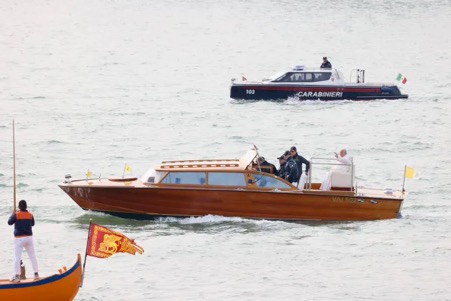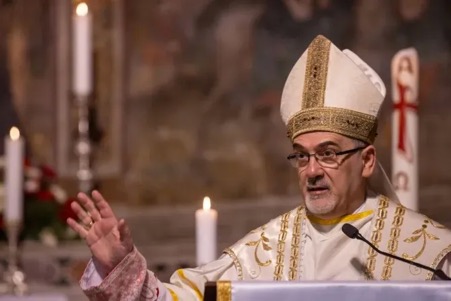The war in Gaza has been “the most difficult trial we have had to face”, the Latin Patriarch of Jerusalem said last week as he marked 200 days of conflict in the territory.
Cardinal Pierbattista Pizzaballa said “not much has changed” in the state of the war in the months since November, but that he has recognised a distinct change in himself and the Catholic community after spending months threatened by the war.
He had “no doubt” about the scale of the challenge, he said, describing the community’s efforts to stem an “excess of pessimism”, especially “with the uncertainty about how much longer this war will last, and even more, what will happen after, because you see one thing is certain – nothing will ever be like before.”
Pizzaballa said the first days of the war were some of the hardest, because the community was still in shock. The next hardest time came during Christmas, when celebrations were forced to be subdued.
He voiced his fear that it will leave a lasting mark on younger people: “The privation of Christmas joy, the feast of Christ who was born to bring peace, was terrible for our Christians, especially for the youngest ones.” He added that “images of the desolation of Bethlehem at Christmas will not be easily forgotten”.
“I think that everything that has happened in these six months has shown in an obvious way, the inescapability of the ‘two-state solution’,” he concluded.
The patriarch, who was made a cardinal in September, took possession of his titular church in Rome on 1 May. The ceremony was originally scheduled for 15 April but was postponed after the Iranian attack on Israel on 13 April prevented Pizzaballa from leaving the country.
Preaching at the Mass in the Church of St Onuphrius, also the titular church of the Order of the Holy Sepulchre of which he is Grand Prior, he said that the effect of the war on the Holy Land’s population was “enormous, more than any other war or conflict”.
He told the congregation that “we would like the United States to solve the problem, as well as the peace negotiations” but at present “nothing is happening”.
“The kingdom of God is not a miracle but the seed in the earth that grows and bears fruit, which is born from the heart of God’s love,” he continued, adding that the kingdom of God “can also be experienced within war”.
Fr Gabriel Romanelli, parish priest of the Holy Family Catholic parish in Gaza, who visited the UK last week, reported that Pope Francis has had a “great impact” on the war, bringing special comfort to the hundreds seeking sanctuary in the parish with his daily phone calls and with his early appeal for a ceasefire.
“I would like to recall that many today invoke a ceasefire but in November only the solitary and courageous voice of Pope Francis called for it,” he said. He added that amidst “the delirium of power and subjugation that creates conflict…I hear only Pope Francis’ voice going in the opposite direction.”
Fr Romanelli told Sky News that three per cent of his tiny community has died since 7 October – 20 have been killed by Israel Defence Forces (IDF) action and 13 have died from lack of medicine and other reasons.
In Gaza as a whole, 14,500 children have been killed over the past six months and at least 34,480 people in total, according to the territory's Hamas-run health ministry.
Despite being stranded in Jerusalem by the conflict, Fr Romanelli has maintained communication with his parishioners and he reported that the people are “tired, sad, and heartbroken”.
Rising temperatures worsened conditions in the thousands of tents and makeshift shelters erected for displaced people in Gaza, without electricity to power fans and or sufficient water to keep hydrated. Last week, temperatures in Rafah reached 40ºC (104ºF).
Despite the conditions, the Greek Orthodox community in Gaza celebrated Palm Sunday according to the Julian calendar last weekend at St Porphyrius Church in Gaza City.
On 29 April, more than 100 organisations in the US issued a demand for “Congress urgently to introduce and pass legislation and for the President to support reinstating funding to the United Nations Relief and Works Agency (UNRWA).” Signatories included Maryknoll Office for Global Concerns, Washington Catholic Worker, and the National Council of Churches.
Their appeal said that “the situation in Gaza is extraordinarily dire, and the need to ensure civilian protection and humanitarian relief is crucial” and “cutting off funding to UNRWA completely erodes the international community’s ability to respond to one of the worst humanitarian crises of our time.”
Prohibiting funding to UNRWA not only affects Palestinians in Gaza, they warned, but also harms over three million Palestinian refugees in the West Bank, Jordan, Lebanon, and Syria who depend on its services for education, financial assistance and access to healthcare.
Last week, Germany became the latest country to signal a resumption of funding to UNRWA, after it was frozen when Israel accused 12 UNRWA staff of participating in the Hamas-led 7 October terror attack.
The decision followed the publication on 22 April of a review led by the former French foreign minister Catherine Colonna into UNRWA’s procedures for ensuring adherence to humanitarian principles of neutrality.
UNRWA was found to have in place, “a significant number of mechanisms and procedures to ensure compliance with the humanitarian principles, with the emphasis on the principle of neutrality, and that it possesses a more developed approach to neutrality than other similar UN or NGO entities.”
The report’s executive summary noted: “In the absence of a political solution between Israel and the Palestinians, UNRWA remains pivotal in providing life-saving humanitarian aid and essential social services, particularly in health and education, to Palestinian refugees in Gaza, Jordan, Lebanon, Syria and the West Bank.”



 Loading ...
Loading ...